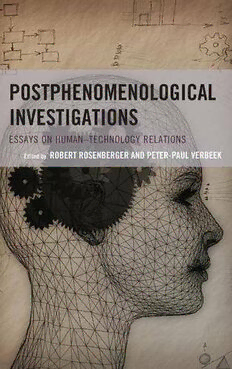
Postphenomenological Investigations: Essays on Human-Technology Relations PDF
Preview Postphenomenological Investigations: Essays on Human-Technology Relations
Postphenomenological Investigations Postphenomenology and the Philosophy of Technology Editor-in-Chief RobertRosenberger,GeorgiaInstituteofTechnology ExecutiveEditors DonIhde,StonyBrookUniversity,Emeritus; Peter-PaulVerbeek,UniversityofTwente Technologicaladvancesaffecteverythingfromourunderstandingsofethics,politics,and communication,togender,science,andselfhood.Philosophicalreflectionontechnology helpsdrawoutandanalyzethenatureofthesechanges,andhelpsusunderstandboththe broadpatternsandtheconcretedetailsoftechnologicaleffects.Thisbookseriesprovides apublicationoutletforthefieldofthephilosophyoftechnologyingeneral,andtheschool of thought called “postphenomenology” in particular. Philosophy of technology applies insights from the history of philosophy to current issues in technology, and reflects on how technological developments change our understanding of philosophical issues. In response,postphenomenologyanalyzeshumanrelationshipswithtechnologies,whilein- tegratingphilosophicalcommitmentsoftheAmericanpragmatisttraditionofthought. Design,Meditation,andthePosthuman,EditedbyDennisM.Weiss,AmyD.Propen,and ColbeyEmmersonReid PostphenomenologicalInvestigations:EssaysonHuman-TechnologyRelations,Edited byRobertRosenbergerandPeter-PaulVerbeek. Postphenomenological Investigations Essays on Human–Technology Relations Edited by Robert Rosenberger and Peter-Paul Verbeek LEXINGTONBOOKS Lanham•Boulder•NewYork•London PublishedbyLexingtonBooks AnimprintofTheRowman&LittlefieldPublishingGroup,Inc. 4501ForbesBoulevard,Suite200,Lanham,Maryland20706 www.rowman.com UnitA,WhitacreMews,26-34StannaryStreet,LondonSE114AB Copyright©2015byLexingtonBooks Allrightsreserved.Nopartofthisbookmaybereproducedinanyformorbyany electronicormechanicalmeans,includinginformationstorageandretrievalsystems, withoutwrittenpermissionfromthepublisher,exceptbyareviewerwhomayquote passagesinareview. BritishLibraryCataloguinginPublicationInformationAvailable LibraryofCongressCataloging-in-PublicationData Postphenomenologicalinvestigations:essaysonhuman-technologyrelations/editedbyRobert RosenbergerandPeter-PaulVerbeek. pagescm--(Postphenomenologyandthephilosophyoftechnology) Includesbibliographicalreferencesandindex. ISBN978-0-7391-9436-2(cloth:alk.paper)--ISBN978-0-7391-9437-9(electronic)1.Technolo- gy--Philosophy--History--20thcentury.2.Phenomenology.3.Postmodernism.I.Rosenberger,Rob- ert(RobertJoseph),editor.II.Verbeek,Peter-Paul,1970-editor. T14.P5762015 303.48'301--dc23 2015004561 TMThepaperusedinthispublicationmeetstheminimumrequirementsofAmerican NationalStandardforInformationSciencesPermanenceofPaperforPrintedLibrary Materials,ANSI/NISOZ39.48-1992. PrintedintheUnitedStatesofAmerica Table of Contents Preface:PositioningPostphenomenology vii DonIhde Introduction 1 RobertRosenbergerandPeter-PaulVerbeek 1:APostphenomenologicalFieldGuide 7 1 AFieldGuidetoPostphenomenology 9 RobertRosenbergerandPeter-PaulVerbeek 2:PostphenomenologicalTheories 43 2 WhyPostphenomenologyNeedsaMetaphysics 45 LenoreLangsdorf 3 WhatRoboticRe-embodimentRevealsaboutVirtualRe- embodiment:ANoteontheExtensionThesis 55 KirkM.Besmer 4 ThinkingTechnologywithMerleau-Ponty 73 AudSisselHoelandAnnamariaCarusi 5 MoviesandBodies:VariationsoftheEmbodiedSelfinScience- FictionTechno-fantasies 85 Marie-ChristineNizzi 6 BodiesasTechnology:HowCanPostphenomenologistsDeal withtheMatterofHumanTechnique? 105 FernandoSecomandi 7 FourDimensionsofTechnologicalMediation 123 AsleH.Kiran v vi TableofContents 3:PostphenomenologicalCases 141 8 TracingtheTracker:APostphenomenologicalInquiryintoSelf- TrackingTechnologies 143 YoniVanDenEede 9 ACenturyonSpeed:ReflectionsonMovementandMobilityin theTwentiethCentury 159 SørenRiis 10 SearchingforAlterity:WhatCanWeLearnFromInterviewing HumanoidRobots? 175 FrancesBottenberg 11 PostphenomenologyoftheRobotMedicalStudent 191 ChrisKaposy 12 MediatingMultiplicity:Brain-DeadBodiesandOrgan TransplantProtocols 203 AdamM.Rosenfeld 13 TowardsaHermeneuticsofUnveiling 215 JanKyrreBergFriis 4:CriticalInterlocutors 227 14 MakingtheGestaltSwitch 229 AndrewFeenberg 15 PostphenomenologywithanEyetotheFuture 237 DianeP.Michelfelder 16 Stability,Instability,andPhenomenology 247 AlbertBorgmann Index 253 AbouttheContributors 261 Preface Positioning Postphenomenology Don Ihde Postphenomenology is a philosophical style of analysis which deals with science and technology studies. It is a recent comer to a series of twentieth and twenty-first century interpretive upheavals regarding science, technolo- gy,culturalstudies,andtechnoscience.Butwheredoesonebegin?Ifthereis a “standard view,” then early modern science is usually thought to begin in the seventeenth century. Yet the term, “scientist,” did not occur or begin to be used until the nineteenth century. William Whewell coined the term in 1833. Before this neologism, “natural philosophy” was the dominant term used. What this shift in terms points to is a deep question: who shall interpret science? Early interpreters would have been identified, anachronistically, as scientists (Galileo, Leewenhoek) or as philosophers (Bacon, Descartes). But if, as I have claimed, early modern science takes much of its specific shape through its technologies—instruments, early often optical—then one must also account for science and technology. And here the same enigma occurs, since the term “technology” does not come into common usage until even later than “scientist.” Historians Thomas Hughes and David Nye have pointedoutthat“technology”asatermemergedintheearlytwentiethcentu- ry. Prior to technology, there were “industrial arts” and “engineering” or “machines.” In short, new terminology arrives after, later than, the shifts whichhavealreadyoccurredconcerningscienceandtechnology.Bythetime Whewellcoins“scientist”thetimesalreadydemonstratedhowsecular,desa- cralized modes of reasoning could be recognized. Similarly, only after mas- siveindustrializationcould“technology”berecognized. vii viii DonIhde Here my issue relates to postphenomenology as a particular mode of science-technology interpretation.Its arrivalcoincides with alate-twentieth- to twenty-first-century radical shift in science-technology analysis. I shall take1979as awatershed year byhighlightingtwo publicationsof that year: Bruno Latour and Steve Woolgar, Laboratory Life: The [Social] Construc- tion of Scientific Facts and my Technics and Praxis: A Philosophy of Tech- nology.Latour’sbookisusuallytakenasalandmarkbookinanewsociolo- gy of science. (It is interesting to note that the original subtitle was the “social construction” of scientific facts, but social was dropped from the subtitle in the second edition.) My book is frequently cited as the first Eng- lish language book on philosophy of technology. (I note in passing that neither Latour nor I knew each other or knew of our respective books then, norwas“Actor-NetworkTheory”nor“postphenomenology”usedasameth- oddescriptor.) I cannot take the time or space here to detail the several and important changes to the understanding of science from its early modern beginnings (seventeenthcentury)throughitsprogressionandgrowing autonomy (eight- eenthcentury)toitselevationasthesuprememodeofknowledge(nineteenth century).Rather,Ishallconcentrateuponarapidsetofchangesbeginningin the twentieth century. Early in the century dominant interpretations were centered in mathematization (Duhem, Mach, Poincare) followed by the rise of positivism (Vienna Circle, et al.) and the interpreters were scientists, philosophers, and historians—mostly mathematizers, logicians, and theory- oriented thinkers.Continuing theidealistictakeonscience as alinear,accu- mulative, and ahistorical-universal knowledge of nineteenth-century inheri- tance, this interpretation dominated. It began to be challenged by the mid-twentienth century with the rise of anti-positivism. Discontinuity theo- rists began to describe “scientific revolutions” and a science saturated with history (Kuhn,Foucault,Feyerabend, etal.). Science, beginning to becultu- rally and historically embedded, also began to be interpreted from a new institutionalization of interpretation through history and philosophy of sci- encedepartments(1950sthroughthe1960s). Alongsidethehistory andphi- losophy of science, there had also existed a sociology of science (Merton) which did look at science practice, but focused largely on outputs—such as citation research and rankings. This sociology of science chronologically coincidedwiththepositivist–anti-positivistdebates.However,bythe1970s, there began yet another more radical shift. Here the earliest origins were largely sociological. The United Kingdom was the early locale, with the social studies of scientific knowledge (SSK) and social constructionism as designators of the new approach (Bloor, Barnes, Collins). As with earlier Mertonian sociology, social constructive approaches continued to forefront science as practice,but unlike theearliersociology, constructiveapproaches
